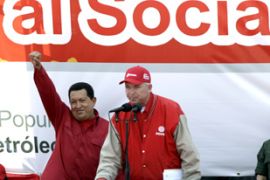Venezuela nationalisation goes on
Control of country’s largest oil reserves are transferred to the state on May day.

“Today, we are ending this perverse era,” Chavez told an audience of PDVSA workers clad in red hats and helmets as two Russian-made Sukhoi jets flew over the Jose Oil plant, 300km east of Caracas.
US concern
“We have buried this policy of the opening up of our oil … an opening that was nothing more than an attempt to take away from Venezuelans their most powerful and biggest natural resource,” he said.
The move is part of a wide-ranging nationalisation launched by the president in January that has already has extended to the telecommunications and electricity sectors, and involved the take-over of unused land and imposed tighter controls over the private health sector.
The decision to take control of the installations will worry investors especially in the US, which buys around 50 percent of Venezuela’s daily output of 3.09 million barrels, and comes a day after Chavez announced Venezuala is leaving the World Bank and the IMF.
The US oil companies Exxon Mobil, ConocoPhillips and Chevron, as well Britain’s BP, Norway’s Statoil and France’s Total obeyed a February decree to transfer operational control of their projects developing the reserve.
The Orinoco is one of the largest oil deposits outside the Middle East and Caracas hopes to certify by 2008 that Orinoco has oil reserves of 1.3 trillion barrels, of which about 20 percent can be extracted with current technology.
The fuel is a highly viscous, extra-heavy oil which needs special processing to turn it into synthetic crude.
Taxing times
Consequently in the past the big oil companies have paid only one percent in royalties for the crude extracted from the area arguing this figure was justified by the high cost of processing the fuel.
Royalties have been raised to 33.2 percent, while taxes have gone up from 34 percent to 50 percent.
Some industry analysts have expressed a concern that PDVSA lacks the experience of some of the more established major oil companies and as a result of their absence could encounter problems with production and safety
But any such concerns seemed far from the minds of the thousands of workers on Tuesday who celebrated assuming control of the Orinoco ventures after a New Year’s Eve-style countdown with some standing atop a pipeline that runs toward the installations.